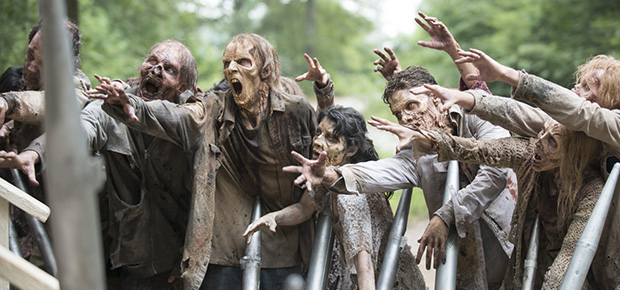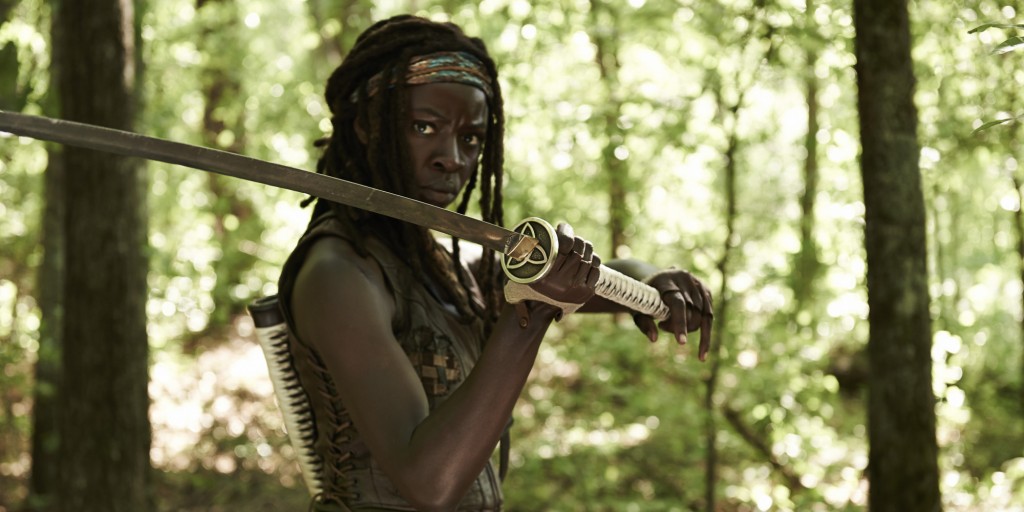The human heart, which would have to be pumping in the zombie chests in order to keep their muscles moving, pushes blood through the human cardiovascular system with such immense pressure that it can spray blood an astonishing thirty feet. So, when you come walking into your living room, katana in hand, only to find your neighbor there waiting to eat your skin, a masterful swipe of your sword may have dealt with the immediate threat, but now you and everything else in your living room is covered in extremely infectious zombie blood. Each swipe of your sword would be met with a super-soaker full of infection, and hand sanitizer would likely be in short supply after the end of the world.
Instead of a long blade, which likely wouldn’t even cut all the way through a human spine or skull unless it was of particularly high quality, extremely sharp, and in the hands of someone with extensive training, carry a blunt force weapon like a baseball bat. A good hard swing with a bat would put any zombie on the ground and greatly reduce the chances of it spraying its virus in your eyes and mouth as it fell. A follow on strike could break its jaw and leave you with the zombie equivalent of an unloaded rifle: something scary looking with very little killing power.
Dress like anyone in a zombie movie. After the end of the world, movie and TV protagonists are often depicted wearing the same clothes they had on when civilization fell. Worn out old shirts and dirty pants coupled with an iconic cowboy hat make a zombie fighter look the part, but tactically, it makes very little sense.
Militaries around the world wear uniforms for a number of reasons. Obviously, concealing your position is important, so camouflage of varying sorts is often utilized. The similarities between uniforms of the same nation can help to identify friendly forces and wearing the same uniform as your fellow soldier helps to instill a feeling of being a part of something bigger than yourself. These uniforms are also designed specifically to be of use to those wearing them in survival or direct fire situations.
The Marine Corps Desert Digital pattern is good for use in desert environments, but would be a poor choice in the Amazon Rain Forest. Likewise, combating zombies in the streets of Milwaukee would require a uniform suited to the specific types of challenges one might face in that battle field.
Zombies don’t carry guns or knives; their weapons are fingernails and teeth… and fingernails and teeth are terrible weapons.
Before setting out for a night on the town in the post-zombacalypse world, zip up in a heavy-duty leather jacket and some canvas or thick denim pants. The suits motorcycle racers wear that can protect them from friction burns after wiping out on black top doing a hundred miles per hour would make you a zombie-fighting version of Iron Man. Nothing in the zombie arsenal could penetrate your incredible suit of armor… that you scooped up off the rack at the mall (well after the Dawn of the Dead folks are already dead). Add gardening gloves and a motorcycle helmet and you could even start calling yourself Ironman. I doubt Marvel would still be levying lawsuits at that point.

If you can walk away from this, you can strut away from a zombie.
Ignore basic hygiene. We can’t smell through the TV, but it’s pretty clear that most of the poor folks we’re watching on The Walking Dead or in zombie movies haven’t had the time or opportunity to hit the showers recently. The problem isn’t the smell, though if you’re surviving with your wife, she’ll likely think that’s a problem too.
Whatever virus it is that’s turning people into zombies wouldn’t be the only infection you’d need to try to avoid. Without the current medical infrastructure in the United States, a simple paper cut could become a life-threatening infection, especially if you’ve been surviving on a diet of limited nutritional value and haven’t been getting enough sleep to maintain your immune system.
Failing to take care of your teeth, for instance, could actually kill you in a survival situation. A rotten tooth could make eating excruciating, and your weakened immune system wouldn’t be able to fend off the ensuing infection. By the time the zombies clawed through your door, there might not be any good meat left on you to eat, all because you stocked up on drinking water and ammo, but forget to pick up any toothpaste.
Staving off infection would have to become your number one priority in any post-apocalypse scenario, regardless of whether zombies were involved or not. Finding a way to clean your body, your mouth and your food is just as important as finding a clean source of drinking water in terms of long-term survival.
The zombie apocalypse may not be impending, but considering the ramifications of one can be a powerful and enlightening method of identifying gaps in your survival strategy. Approaching new and unique problems can force you engage in critical thinking you may not otherwise, resulting in a better-rounded plan with higher chances for success.
It’s also kind of fun to pick apart a zombie movie from time to time.
The six issues laid out in this and the first installment of what we all get wrong about the zombie apocalypse are meant to be a bit tongue in cheek, but the way you approach the topic can have real ramifications in a survival situation.
So just ask yourself, if the world were lost to zombies, aliens, or guerrilla revolutionaries, would you want to be the guy that died of a tooth ache?
Image courtesy of AMC and MotoGP











COMMENTS